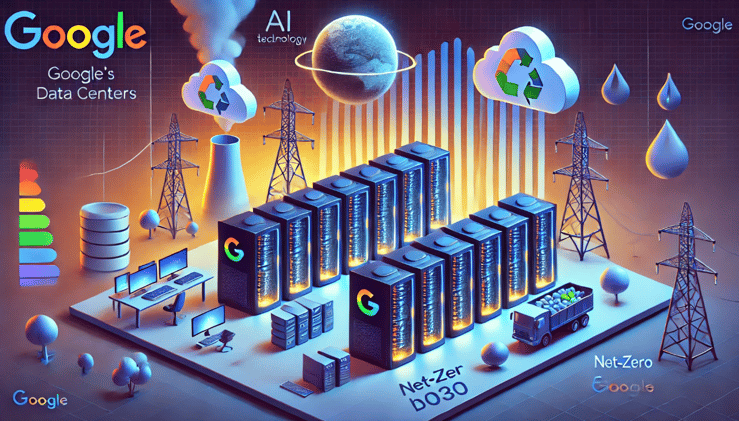The Rise of AI-Related Emissions: A Growing Concern
Google’s latest environmental report has sparked concerns about the company’s commitment to achieving net-zero carbon emissions by 2030. According to the report, Google’s carbon emissions have surged by a staggering 48% since 2019, primarily driven by energy-intensive data centers and supply chain emissions required to support AI systems.
Rising Emissions and AI’s Impact
In their environmental report, Chief Sustainability Officer Kate Brandt and Senior Vice President Benedict Gomes acknowledged the challenges facing Google: "In spite of the progress we’re making, we face significant challenges that we’re actively working through." The surge in emissions is largely attributed to the increasing demand for energy-intensive data centers and supply chain emissions required to support AI systems like Google’s Gemini and OpenAI’s ChatGPT.
Data Centers and Energy Consumption
Google’s data centers are estimated to account for up to 10% of global data center electricity consumption, with electricity and water usage both increasing by 17% between 2022 and 2023. This trend is not unique to Google; other tech giants like Amazon and Microsoft also report significant increases in greenhouse gas emissions.
The Report’s Findings
The environmental report reveals that Google released 14.3 million metric tons of carbon dioxide in the past year, a 13% increase from the previous year. This rise in emissions is particularly concerning given Google’s net-zero goals for 2030.
Net-Zero Goals Under Strain
Google admits that achieving net-zero by 2030 will be challenging: "As we further integrate AI into our products, reducing emissions may be challenging due to increasing energy demands associated with the expected increases in our technical infrastructure investment." This admission highlights the tension between Google’s ambitions and the reality of its operations.
Industry-Wide Concerns
Climate scientists express concerns about Big Tech companies like Google, Amazon, and Microsoft continuing to invest heavily in AI. While Bill Gates argues that AI could ultimately reduce more carbon than it adds, the immediate rise in emissions is troubling. The growing reliance on energy-intensive data centers raises questions about the sustainability of current practices.
AI’s Potential to Accelerate Climate Action
Despite these concerns, Google’s report claims that AI can help "boldly accelerate climate action" by optimizing complex systems. Google has pledged to operate on carbon-free energy around the clock within each power grid by 2030. However, with an average of only 64% carbon-free energy used to power its data centers and offices last year, there is still much work to be done.
Call for Systemic Change
The report emphasizes the need for systems-level change, strong government policies, and new technologies: "A sustainable future requires systems-level change, strong government policies, and new technologies. We’re committed to collaboration and playing our part, every step of the way." This call for systemic change highlights the need for a fundamental shift in the way we approach sustainability.
Global Impact and Future Outlook
According to the International Energy Agency (IEA), global AI data centers currently use 1% of the world’s electricity, a figure expected to double by 2026. This increase could hinder efforts to combat climate change, underscoring the need for more sustainable practices in the tech industry.
Conclusion
Google’s environmental report highlights the challenges facing the company as it strives to achieve net-zero carbon emissions by 2030. The surge in AI-related emissions is a growing concern that requires attention from both Google and the broader tech industry. By acknowledging these challenges and working towards systemic change, we can ensure a more sustainable future for all.
Recommendations
- Increase investment in renewable energy: Google should prioritize investing in renewable energy sources to power its data centers and operations.
- Implement more efficient data center design: The company should explore innovative data center designs that minimize energy consumption while maintaining performance.
- Develop new technologies for AI sustainability: Researchers and developers should focus on creating sustainable AI systems that optimize complex processes without increasing emissions.
- Collaborate with governments and stakeholders: Google must work closely with governments, NGOs, and other stakeholders to develop effective policies and technologies for a more sustainable future.
References
- International Energy Agency (IEA). (2023). The Future of AI: Opportunities and Challenges.
- Google. (2023). Google’s Environmental Report.
- Bill Gates. (2022). How AI Can Help Fight Climate Change.

